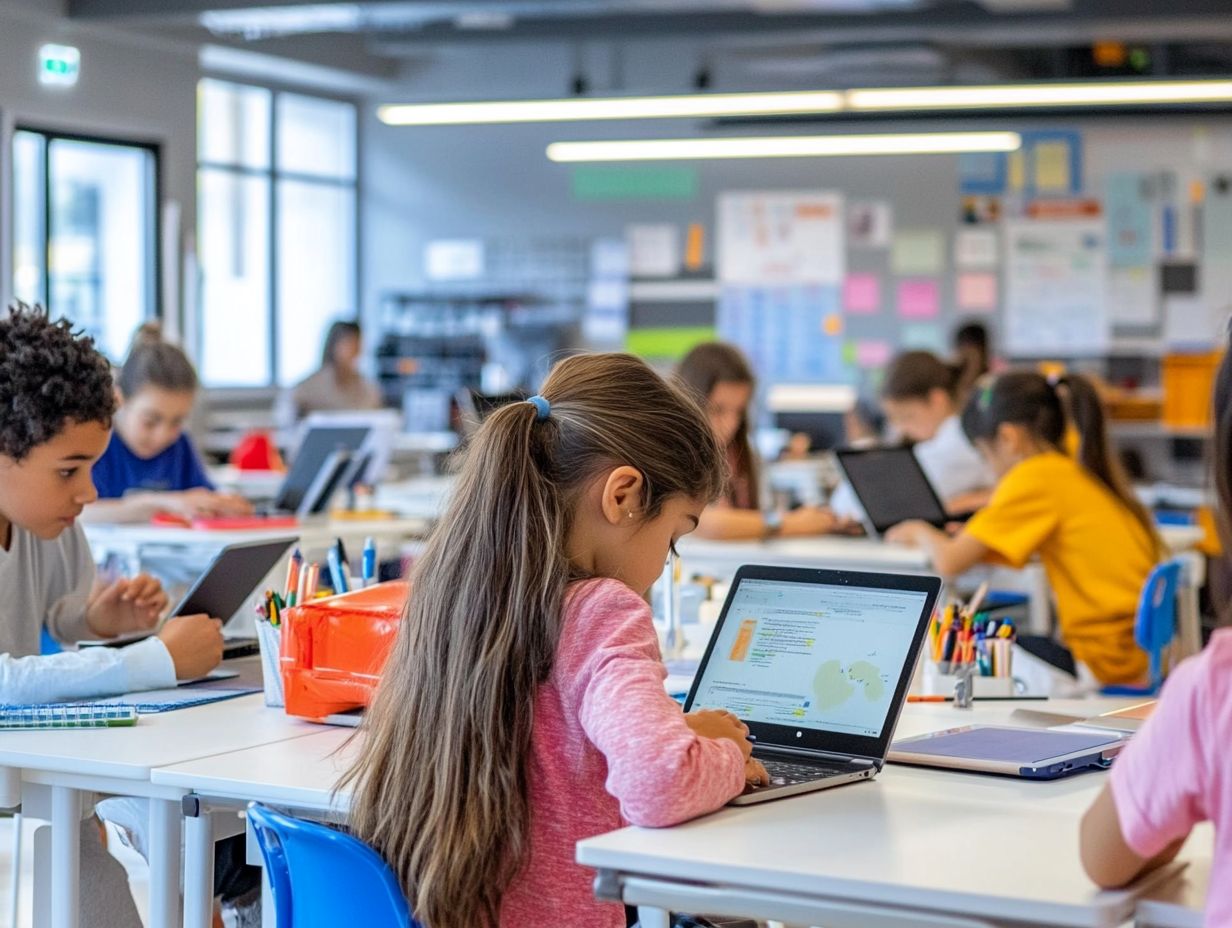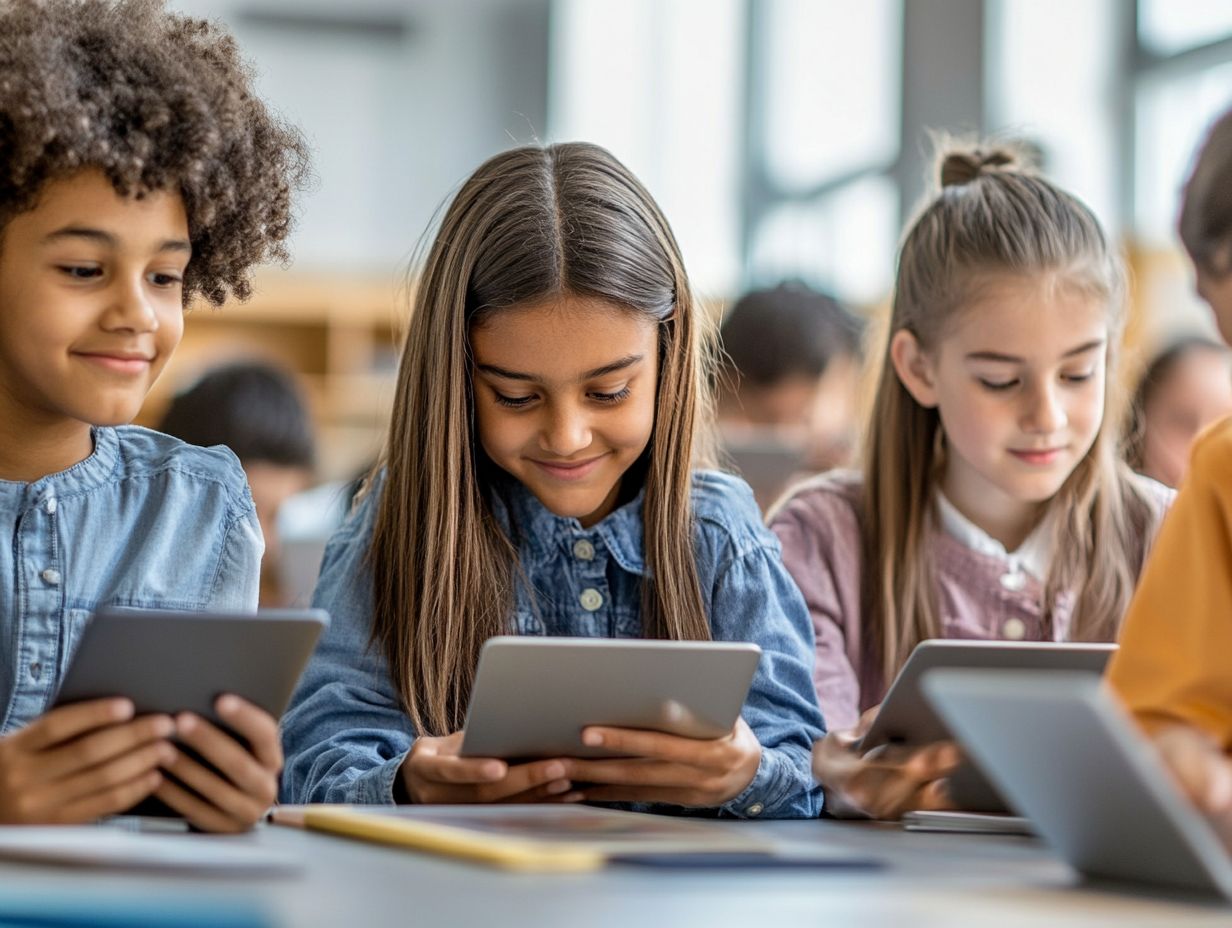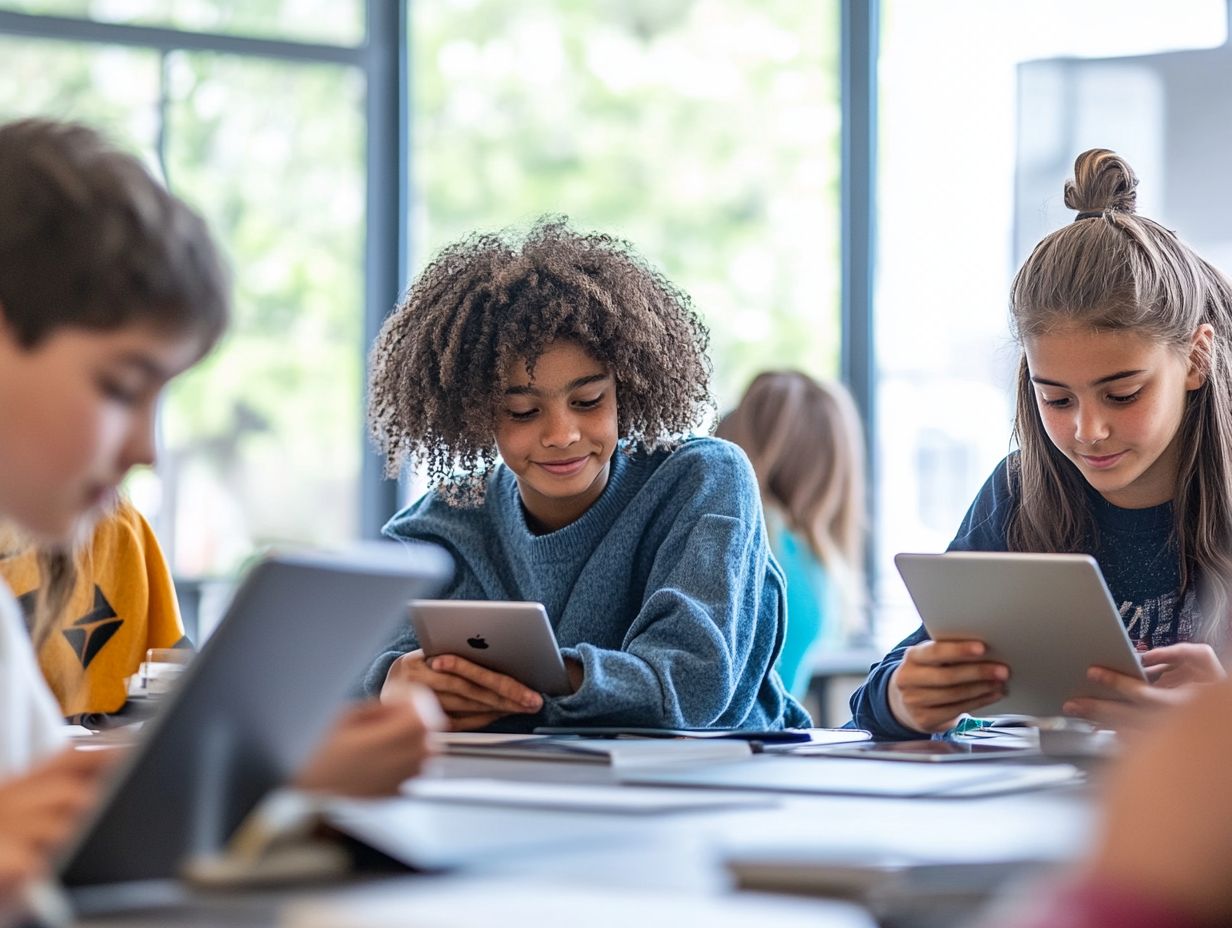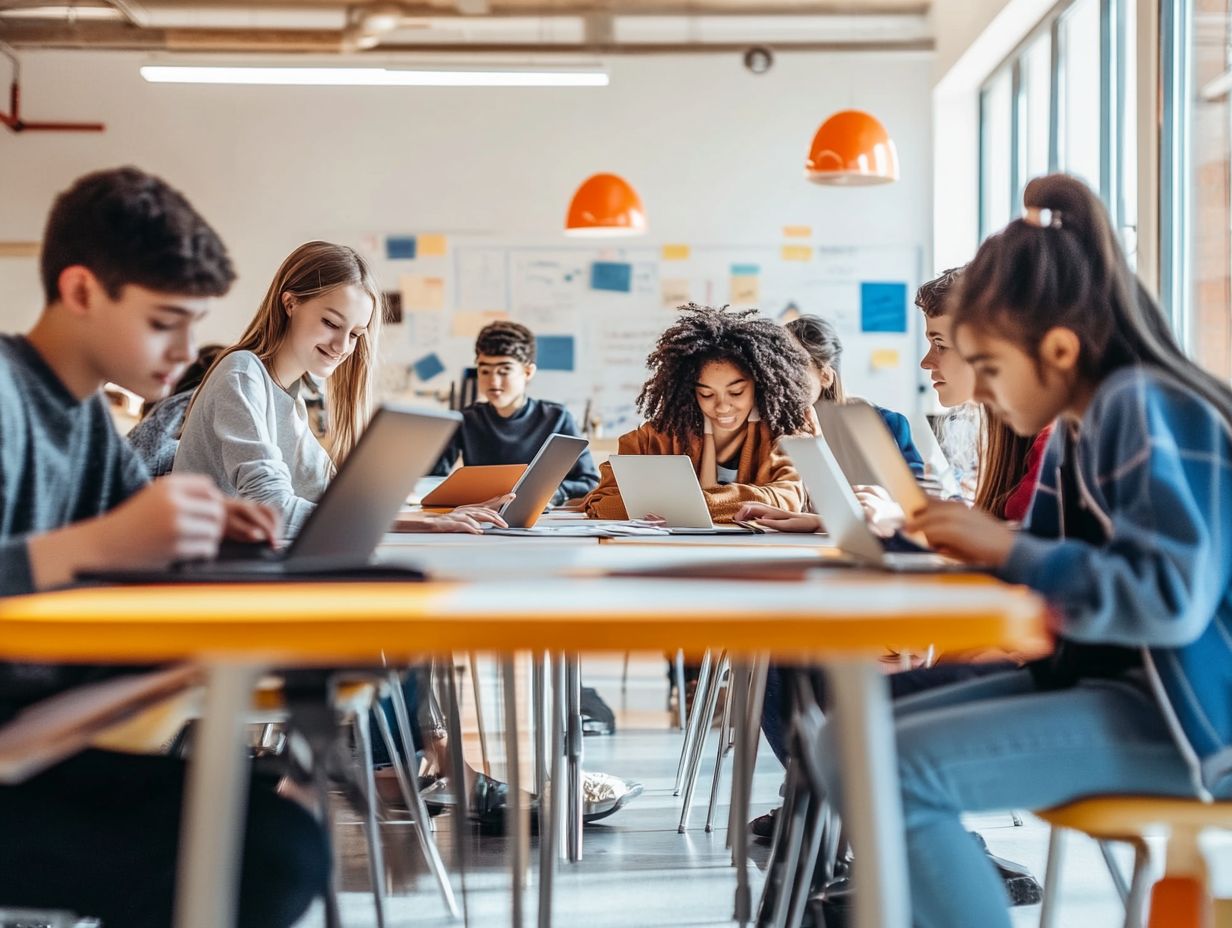As we navigate the continuously evolving landscape of education, understanding current trends and their implications is essential for students, educators, and policymakers alike.
This article examines the key challenges and opportunities that are shaping today’s educational environment, along with anticipated trends for 2024.
From technological advancements to shifts in teaching methodologies and changes in education policy, we investigate how these developments impact students and discuss effective strategies for adapting to this dynamic landscape.
We invite you to engage with us as we explore the future of education and identify approaches to prepare for what lies ahead.
Defining Educational Trends

Educational trends are instrumental in shaping the learning environment and influencing student engagement with knowledge. As we approach 2024, significant trends such as personalized education and adaptive learning are gaining prominence, driven by the increasing integration of artificial intelligence in educational settings.
These advancements not only enable the development of innovative teaching strategies but also foster lifelong learning, thereby equipping learners with the essential skills needed in a knowledge-driven economy.
Additionally, the emphasis on educational equity and digital literacy is of paramount importance, as it ensures that all students, irrespective of their background, have access to the necessary resources for success in the 21st century.
Current Educational Landscape
The current educational landscape is undergoing a substantial transformation influenced by the rise of online learning and hybrid learning models.
As educational institutions adapt to the demands of the digital era, remote education has gained prominence, resulting in the emergence of virtual classrooms as essential platforms for student engagement.
Innovative educational technology (EdTech) solutions are at the forefront of this transition, enabling interactive learning experiences that address the diverse needs and preferences of students.
These advancements are fundamentally reshaping the approaches educators take in their teaching methods and altering how students engage with educational content, thereby redefining the concept of learning in the contemporary context.
Key Challenges and Opportunities
The transition to remote learning has posed numerous challenges, particularly in ensuring educational equity and addressing the digital divide. However, it has also provided educational institutions with unique opportunities to innovate and reimagine their approaches to teaching and learning.
By emphasizing skills-based training and fostering community engagement, educators can develop inclusive learning environments that accommodate a diverse student population, thereby driving the digital transformation in education.
In this continually evolving landscape, students encounter significant obstacles, including limited access to reliable technology and difficulties in maintaining engagement within a virtual environment. Many educators are now confronted with the responsibility of devising creative solutions to sustain learner motivation, such as incorporating interactive platforms that enhance lesson engagement.
The emergence of community partnerships represents a viable pathway to bridge the access gap, enabling local organizations to assist under-resourced students by providing essential tools and resources.
Through collaborative efforts, both educators and students have the opportunity to redefine traditional pedagogies, ensuring that learning is not only more equitable but also more relevant in this digital age.
Predicted Trends for 2024
As we approach 2024, several anticipated trends are poised to transform the educational landscape, including the integration of gamification and experiential learning strategies. These methodologies prioritize engagement and active participation, thereby fostering a more enriching learning environment.
Furthermore, competency-based education is gaining prominence, enabling students to advance at their own pace while demonstrating mastery through online assessments. To support these developments, comprehensive teacher training programs are essential, equipping educators with the necessary tools to implement these innovative pedagogical approaches effectively.
Technological Advancements in Education

Technological advancements are transforming the educational landscape by introducing a variety of digital tools and learning management systems that significantly enhance the learning experience. The emergence of educational technology enables educators to engage students in innovative ways, utilizing immersive experiences such as virtual reality to facilitate deeper understanding.
Furthermore, cloud-based learning solutions are increasingly gaining traction, providing seamless access to educational content and resources, which contributes to a richer learning environment.
Interactive platforms, such as Google Classroom and Edmodo, promote collaborative learning by allowing educators to distribute assignments and provide immediate feedback, thereby maintaining student motivation and accountability.
In addition, analytics tools like Kahoot and Quizizz enable educators to evaluate the effectiveness of their teaching strategies through real-time assessments and gamified learning experiences.
Adaptive learning technologies, represented by platforms such as DreamBox and Knewton, personalize the educational journey by adjusting task difficulty according to individual student progress, ensuring that each learner has the opportunity to thrive at their own pace.
Shifts in Teaching and Learning Methods
The education sector is undergoing significant transformations in teaching and learning methodologies, increasingly adopting student-centered approaches that emphasize active engagement.
Project-based learning is becoming a prominent strategy for developing critical thinking and problem-solving skills, while flipped classrooms enable students to explore topics at their own pace before applying their knowledge in a collaborative setting.
Interdisciplinary learning is also emerging as a valuable approach, allowing students to draw connections between concepts across various subjects, thereby enhancing their overall comprehension.
These evolving methodologies not only enhance student participation but also render learning more relevant and meaningful.
For instance, in a high school science class, educators can implement project-based learning by engaging students in real-world experiments that address environmental challenges within their community.
Similarly, in a middle school environment, instructors may utilize flipped classrooms by providing online lectures and discussions, thereby freeing up classroom time for collaborative, hands-on activities.
Interdisciplinary learning is particularly beneficial in elementary education, where teachers can integrate mathematics and art by encouraging students to create geometric sculptures, illustrating the interconnectedness of subjects and fostering a deeper appreciation for the learning process.
Changes in Education Policy
Changes in education policy are essential for adapting to the evolving educational landscape, underscoring the necessity for reform that aligns with contemporary standards. Policymakers are increasingly prioritizing the establishment of educational standards that include digital citizenship, promoting the responsible and ethical use of technology among students.
Global education trends emphasize the critical role of educational leadership in driving these reforms and ensuring equitable access to quality education for all learners.
As these transformations occur, educators must navigate the complexities of new frameworks, which often require professional development and support to effectively integrate innovative practices into their teaching. The evolving policies demand that school leaders not only advocate for necessary changes but also devise comprehensive strategies that enable teachers and equip them with the tools needed to adapt.
In this dynamic environment, the role of educational leadership becomes paramount, as leaders are responsible for fostering a culture of collaboration and continuous improvement, thereby enhancing student engagement and learning outcomes.
Impact of Educational Trends on Students
The impact of educational trends on students is significant, shaping their learning outcomes and overall academic experiences.
As trends such as personalized education and competency frameworks gain prominence, students are experiencing increased motivation and engagement in their learning journeys.
Furthermore, the focus on career readiness and mentorship programs is equipping students for the workforce, ensuring they acquire the essential skills and knowledge required to succeed in their respective fields.
Preparing for the Future of Education

Preparing for the future of education requires the deliberate equipping of students with lifelong skills that promote self-directed learning and adaptability. As educational landscapes continue to evolve, the significance of global learning and cultural competence in education is paramount.
Innovative pedagogical approaches that emphasize these elements will enable students to thrive in diverse environments and effectively navigate the complexities of an ever-changing world.
To adequately prepare students for emerging challenges, it is crucial to prioritize the development of critical thinking, collaboration, and digital literacy. Educators can implement project-based learning initiatives that engage students in addressing real-world problems, thereby demonstrating their capacity for innovation and teamwork.
Incorporating technology into the classroom not only enhances student engagement but also provides learners with the tools they will encounter in the professional environment. For example, utilizing online platforms for group discussions encourages collaboration and enables students to interact with peers globally, fostering a profound understanding of cultural diversity.
These actionable strategies can substantially shape the skills essential for future success.
Strategies for Adapting to Educational Trends
Adapting to educational trends necessitates the adoption of strategic approaches that integrate coaching in education and online collaboration to enhance teaching effectiveness. Educators must utilize research-based practices and establish community-based education initiatives that offer students a variety of educational resources.
This proactive methodology ensures that institutions remain responsive to the evolving educational landscape and effectively support student learning.
Tips for Students, Teachers, and Institutions
Effective teacher-student interaction is crucial for fostering a positive learning environment, benefiting both students and educators through the adoption of educational technology trends. Mentoring programs can enhance adaptive learning experiences by providing personalized guidance. Cultivating learning ecosystems that encourage collaboration will result in more enriching educational experiences.
To facilitate this, educational institutions should prioritize investment in professional development workshops that equip educators with the necessary skills to integrate technology seamlessly into their teaching practices. For example, utilizing online platforms that enable real-time feedback can enable students to take ownership of their learning. Additionally, creating virtual study groups can promote peer-to-peer support, making the learning process more dynamic and interactive.
By incorporating gamification strategies, educators can engage students more effectively, transforming traditional lessons into enjoyable and memorable experiences. In this manner, all stakeholders can contribute to the development of a more engaging educational environment that fosters continuous growth and improvement.
Frequently Asked Questions
What are some major educational trends expected in 2024?

Some of the major educational trends expected in 2024 include personalized learning, virtual and augmented reality in classrooms, and an increased focus on digital literacy and coding.
How will personalized learning impact education in 2024?
Personalized learning, which tailors educational experiences to individual students, is expected to continue growing in popularity in 2024. This trend allows for a more personalized and student-centered approach to education, potentially increasing student engagement and achievement.
Will virtual and augmented reality be widely used in classrooms by 2024?
It is predicted that virtual and augmented reality technology will become more prevalent in classrooms by 2024. This technology can enhance learning experiences by immersing students in virtual or augmented environments, making lessons more interactive and engaging.
Why is digital literacy and coding becoming more important in education?
In today’s digital world, having strong digital literacy skills and coding knowledge is crucial for future success. As technology continues to advance, these skills will be in high demand in the job market. Therefore, educational institutions are placing a greater emphasis on teaching these skills to prepare students for the future.
How will technology impact traditional teaching methods in 2024?
Technology is expected to play a significant role in changing traditional teaching methods in 2024. With the rise of online learning platforms, flipped classrooms, and other digital resources, educators will have more tools at their disposal to enhance their teaching and cater to diverse learning styles.
What impact will global events have on educational trends in 2024?
The COVID-19 pandemic has already accelerated the adoption of online learning and technology in education. It is likely that global events and advancements in technology will continue to shape educational trends in 2024, potentially leading to more flexible and innovative approaches to teaching and learning.




